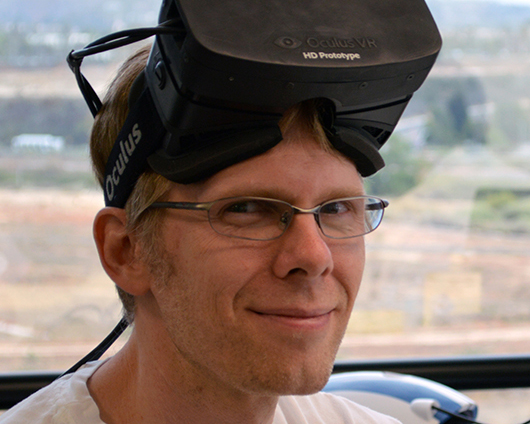
Oculus consulting CTO John Carmack has been bullish on the idea of “the metaverse” for a long time, as he’ll be among the first to point out. But the id Software co-founder spent a good chunk of his wide-ranging Connect keynote Thursday sounding pretty skeptical of plans by the newly rebranded Meta (formerly Facebook) to actually build that metaverse.
“I really do care about [the metaverse], and I buy into the vision,” Carmack said, before quickly adding, “I have been pretty actively arguing against every single metaverse effort that we have tried to spin up internally in the company from even pre-acquisition times.” The reason for that seeming contradiction is a somewhat ironic one, as Carmack puts it: “I have pretty good reasons to believe that setting out to build the metaverse is not actually the best way to wind up with the metaverse.”
Today, Carmack said, “The most obvious path to the metaverse is that you have one single universal app, something like Roblox.” That said, Carmack added, “I doubt a single application will get to that level of taking over everything.” That’s because a single bad decision by the creators of that walled-garden metaverse can cut off too many possibilities for users and makers. “I just don’t believe that one player—one company—winds up making all the right decisions for this,” he said.
The idea of the metaverse, Carmack says, can be “a honeypot trap for ‘architecture astronauts.'” Those are the programmers and designers who “want to only look at things from the very highest levels,” he said, while skipping the “nuts and bolts details” of how these things actually work.
These so-called architecture astronauts, Carmack said, “want to talk in high abstract terms about how we’ll have generic objects that can contain other objects that can have references to these and entitlements to that, and we can pass control from one to the other.” That kind of high-level hand-waving makes Carmack “just want to tear [his] hair out… because that’s just so not the things that are actually important when you’re building something.”
“But here we are,” Carmack continued. “Mark Zuckerberg has decided that now is the time to build the metaverse, so enormous wheels are turning and resources are flowing and the effort is definitely going to be made.”
Build products, not architecture
Carmack used his own experience creating Doom as an example of the value of concrete, product-based thinking. Rather than simply writing abstract game engines, he wrote games where “some of the technology… turned out to be reusable enough to be applied to other things,” he said. “But it was always driven by the technology itself, and the technology was what enabled the product and then almost accidentally enabled some other things after it.”
Building pure infrastructure and focusing on the “future-proofing and planning for broad generalizations of things,” on the other hand, risks “making it harder to do the things that you’re trying to do today in the name of things you hope to do tomorrow, and [then] it’s not actually there or doesn’t actually work right when you get around to wanting to do that,” he said.
To that end, Carmack spoke somewhat approvingly of concrete Meta products like Horizon Worlds and Horizon Workrooms, which can be clearly judged on how much value they’re bringing to users. Interacting with other avatars in Workrooms, in particular, can be much more enjoyable than staring at a wall of Zoom faces, Carmack said. “You’ve got to actually be using the things to make value from it,” he said. Getting Workrooms to actually work also required some detailed technical problem solving to help with unexpected audio processing and latency issues, solutions that can now be applied to many other metaverse products, he added.

But while Carmack identified some “good things” about the virtual reality co-presence possible in Horizon Worlds, he noted that it’s “a far cry from the metaverse of our visions.” While chatting with 16 people in a Worlds room is nice, he said, it’s a far cry from something like a real-world conference that could have “thousands of people milling about” and wandering into sessions and conversations at a whim. Fully creating that kind of in-person conference experience, without the need to travel long distances, is “what we’ve always been pitching is the value of VR,” he said.
With that vision in mind, Carmack said he is “laying down a gauntlet” that “we should be doing [Facebook Connect] in the metaverse” by next year’s show. “I’ll be really disappointed if I’m sitting here next year in front of a video crew and a camera in physical reality doing this talk,” he said. “I want to be walking around the halls or walking around the stage as my avatar in front of thousands of people, getting the feed across multiple platforms.”
Focusing on a mission of moving Connect into the metaverse, Carmack said, is a concrete goal that will “make sure that we’re doing something that’s valuable to at least us, and then it will very likely be valuable to a lot of other places.”
https://arstechnica.com/?p=1808977

